READER COMMENTS ON
"Russert Testifies in Libby Trial"
(33 Responses so far...)
COMMENT #1 [Permalink]
...
big dan
said on 2/8/2007 @ 8:06 pm PT...
I was just watching the INN Report, and they said,
""""""""""""""""""""""""""""""
*** A New Jersey Emergency Medical Technician has gone public on how
emergency workers were told that Building 7 was going to be "pulled".
A 20 second demolition countdown was broadcast over emergency workers
radios before its collapse. The ground zero rescue worker who for now
wishes to remain anonymous also witnessed multiple underground support
columns of the WTC towers which were severed before the buildings
imploded.
""""""""""""""""""""""""""""""""
...anyone think that's a huge deal?
COMMENT #2 [Permalink]
...
big dan
said on 2/8/2007 @ 8:07 pm PT...
....that's not big news, is it?
COMMENT #3 [Permalink]
...
MMIIXX
said on 2/8/2007 @ 9:53 pm PT...
BIG DAN do you have a link for that story ?
mick
COMMENT #4 [Permalink]
...
MMIIXX
said on 2/8/2007 @ 9:57 pm PT...
COMMENT #5 [Permalink]
...
Larry Bergan
said on 2/9/2007 @ 1:13 am PT...
I haven't yet heard why Russert is on crutches. Does anybody know why?
Why doesn't the "Wilson's wife is fair game" quote from Rove to Chris Matthews ever get talked about and why does Chris Matthews never bring Bush into the conversation. Diane Rhem mentioned Bush may be involved and I read it in another publication.
COMMENT #6 [Permalink]
...
Larry Bergan
said on 2/9/2007 @ 1:17 am PT...
Why would Libby think he could get away with blaming Russert so easily.
Questions, Questions!
Big Dan:
Even the Jewish guy who owned building number 7 said he had the building pulled, and it never got into the news, so I hate to say it, but that has already come out.
COMMENT #7 [Permalink]
...
gtash
said on 2/9/2007 @ 3:34 am PT...
Uh, back to the point (although I am intriqued by BigDan's comments too):
The connection from Russert to NBC to war profits (by reporting at the beck-and-call of warmakers) as an ethical proposition for journalists---I think you stated it very well indeed. I had not really thought of it in quite the way you put it. My mind is always drawn to the influence of money on shareholders and management when talking about corporate media. It's a kind of Lou Dobbs drift. You reme,ber when GE used to run prominently its role in the radio show "Marketplace"--and then they announced they would quit publicly underwriting it---but they still kept the themesong to the show without the "jingle" inserted into it? I never trusted anything about the objectivity of that show after that time--I should have questioned it before, but ti was only after that big deal GE made (and the loss of the jingle) that I thought about how much influence they had over the show. Now, you have spotlighted journalistic ethics in a bigger way for me. Russert disclosing in every story that his boss gets paid for making the war look goooood---(so, don't expect to hear the bad stuff from me!). I'd love to see that disclaimer. Just play the GE jingle during the MTP opening theme.
COMMENT #8 [Permalink]
...
Dredd
said on 2/9/2007 @ 3:39 am PT...
Larry #5
Tim was hurt by having to tell the truth which ends up hurting his old cronies rather than helping them as usual. Russert was the regime's go-to-press-guy just as Jeffie Gannon was Snottie McClellan's go-to-guy.
Timmy's feelings were hurt when his "journalism" was exposed as partisan propaganda.
Poor Timmy ... doncha feel sorry for him?
COMMENT #9 [Permalink]
...
czaragorn
said on 2/9/2007 @ 6:40 am PT...
Yeah, Dredd, poor Timmy! He didn't even get a chance to spew about Clinton's cock this time around. What is his world coming to?
COMMENT #10 [Permalink]
...
KestrelBrighteyes
said on 2/9/2007 @ 7:18 am PT...
Larry Bergen re: #5 - He said that he broke an ankle and will be on crutches for 10 weeks. Firedoglake is doing a great job of keeping up with everything, including live-blogging from the trial. I expect to hear about more indictments being brought once this trial is over - may be just wishful thinking on my part, but I don't think so.
Big Dan re: #1 - Wow. I need to read about and digest that one before I can even comment on it.
COMMENT #11 [Permalink]
...
Dredd
said on 2/9/2007 @ 7:26 am PT...
Momma Burns asks:
"What did we learn from Tim Russert today, children?"
That Fitzgerald is going to be taken out if he keeps "going after the good guys".
Gonzales is following orders to get rid of prosecutors that prosecute republicans (link here).
COMMENT #12 [Permalink]
...
Grizzly Bear Dancer
said on 2/9/2007 @ 9:13 am PT...
While the hearsay about the owner of the only privately owned World Trade Tower (#7) said to "PULL IT," there has NEVER been an INDEPENDENT CRIMINAL INVESTIGATION to this collapse or 9/11 for that matter. In fact most American people do not even know 3 World Trade Towers collapse on 9/11 which is just the way these terrorists likes it. The corporate mass media in conjunction with the government and their BS 9/11 commission which was not even allowed at ground zero has covered up the truth.
NO VIDEOS playing over and over and over again showing #7 parroting a story about box-cutter wielding arabs hijacking a commercial jet and flying them into this tower..because it didn't happen.
What intrigues me is how so many people, firemen, cops, whoever could live this lie in the DESTRUCTIVE WAKE of the current Bush/Cheney armegedon.
Facts:
1. Trillions missing the day before from the Pentagon.
2. CONSPIRATOR Guiliani had and entire floor.
3. Marvin Bush former security co. did all the security.
4. The 47 story steel concrete tower had a small containable structure fire on the 22nd floor (i believe), no windows broken and NY Firemen prepared to raise a US flag blocking in front of the building.
5. Evacuated at 9AM it fell 10 hours later in 6 seconds.
6. Over 1 block away from the twin towers, it was separated by World Trade Tower Building #6 thus there could never be a connection outside the fact that all 3 towers fell the same way..CONTROLLED DEMOLITION.
7. American people have to come forward and tell the truth so we can get these lying murderers and ant-environmentalists destructive plan of their greedy domination.
The Bushit administration is responsible for 9/11 and everyday of their do nothing approach to HUMAN CAUSED GLOBAL WARMING CLIMATE CHANGES spins our world and all living things created carelessly, dangerously, out of control. They stand for greed, lying, mismanagement and manipulating the system to a fascist rovian perfection. These fcks need to go to jail ASAP!
COMMENT #13 [Permalink]
...
sam
said on 2/9/2007 @ 9:32 am PT...
Big Dan...
I think 9/11 is huge and important...
that said...look outside...step away from the computer...step far away...Imagine your an indigenous Mayan in southern Mexico...Imagine you've never seen a computer...
The only things that matter are food, people who are true and you can trust, and staying out of the surrounding chaos...this country is already gone. I'm not a defeatist, it just a perspective.
I'm glad some are waking, but most will sleep until they die.
COMMENT #14 [Permalink]
...
Grizzly Bear Dancer
said on 2/9/2007 @ 10:05 am PT...
That may be true (directive to Big Dan) however if we are going to save and sustain life on this planet, we the United States have to become WORLD LEADERS as opposed to being run by the BIGGEST WORLD LOSERS. If we do not come together and lets these bastard continue their war of lies and assalt on the environment, as well as everything else since orchestrating 9/11, we are taking away any chance for our children to have anything remotely close to what we had growing up. WAKE UP!
This is a link to a letter against the new anti-environmentalist Bushit budget. READ IT! http://action.wilderness...udget08/i3s3dxi4p5eibei?
Bush's perpetuation of wars leading to a nuclear demise or inaction by the criminals in highest offices of Federal power. US is #1 contributer of human caused global warming climate change. The arctic melted the size of TEXAS last year. Listen to me..we have 2 years to fix OR it will be so accelerated we will not be able to do anything. It will cause over 1 million specie extinctions in 4o years. Educate yourself.
COMMENT #15 [Permalink]
...
Grizzly Bear Dancer
said on 2/9/2007 @ 10:08 am PT...
to clarify, the previous comment was to #13.
COMMENT #16 [Permalink]
...
sam
said on 2/9/2007 @ 10:28 am PT...
sometimes I go to CNN to check the propaganda de jour, today--4 pics of Anna Nicole Smith on the front page. Really WTF. Pop culture is a disease of blindness.
It will take a social and economic revolution to overthrough the facsist police state...the age of oil is over and we're broadening the age of control, with institutions that promote ignorance. Fight the battles locally, fight for sustainble food and an environment that will support life. Kill the chaos.
COMMENT #17 [Permalink]
...
sam
said on 2/9/2007 @ 10:42 am PT...
To:#14 "the United States have to become WORLD LEADERS as opposed to being run by the BIGGEST WORLD LOSERS"
correction--->the un-united people of the United States have to become the PRO-ACTIVE WORLD LEADERS as opposed to greedy and apathetic...You are the only person that will ever save you.
COMMENT #18 [Permalink]
...
Grizzly Bear Dancer
said on 2/9/2007 @ 10:56 am PT...
U and I can got to save it this time!
COMMENT #19 [Permalink]
...
sam
said on 2/9/2007 @ 11:01 am PT...
OK, I'm building a solar powered school bus...to get out of housing debt...I want to sell my car but it's hard to live without...
what you doin'
COMMENT #20 [Permalink]
...
sam
said on 2/9/2007 @ 11:29 am PT...
of course I have a 19 year old brother in the Army...I watched Loose Change with him before he shipped of to Germany(training for armored infantry). "What you want me to do?" was his reaction.
This is the problem we face.
The school bus and my brother are the truth, I'm not making it up. I feel like I'm in the North and he's in the South and where hurling musket balls at each other.
COMMENT #21 [Permalink]
...
Arry
said on 2/9/2007 @ 11:37 am PT...
Lot of people doing stuff. See this and this.
It's not one or the other. You have to fight the monster, too.
COMMENT #22 [Permalink]
...
Grizzly Bear Dancer
said on 2/9/2007 @ 12:28 pm PT...
STORMY WEATHER
101 Solutions to HUMAN CAUSED
Global Warming Climate Change by Guy Dauncey and Patrick Mazza
http://www.earthfuture.com/stormyweather/
Stir a public outcry of the American populace and encourage world involvement. Once people are educated as to the TRUTH, we help people get the cause and effect. This "war on terror" has been used by the Bush crime family as the mother of ALL EXCUSES for most their actions AND supported by the corporate owned mass media parrots since orchestrating war games on 9/11. Make the disillusioned sheep connect the dots and become an informed flock! Strength in numbers my friend.
Independent criminal investigation starting with WORLD TRADE BUILDING #7.
Our US system of evoting and counting votes in secrecy is a sham and that's why i come here when i can. Brad and people who write here are MODERN PATRIOTS using their voice as well as getting involved to fix our corrupt broken system.
WE CAN DO IT!
U and I got to save them this time. Imagine if other species had a voice and half the story like us. Facts and evidence we have about the greedy 1% interests being served the Bushit administration crime family. They will mismanage to a destructive unless we (collectively) stop them. As i said in an earlier post if not by people fighting a US takeover or response (like the deaths of 600,000 Iraqi civilians) then we have 2 years to fix put our heads together and solve the environmental crisis.
Let me help you..they would say
JOIN THE FIGHT TO PRESERVE AND PROTECT THIS PLACE WE LIVE CALLED HOME!
COMMENT #23 [Permalink]
...
Larry Bergan
said on 2/10/2007 @ 12:13 am PT...
Meet The Press has turned into one of the least interesting shows on television. If I need to see Joe Biden or John McCain I can see them on any other show I don't want to watch.
We have a lot of cooperative thinking to do if we're going to find a way out of the mess we're in. Meet The Press is NOT the forum for that.
Commercial television has run it's course.
The internet embodies what the inventor of the television had in mind. A learning tool. He wouldn't let his children watch it in the 70's. You can just imagine what he would think of it, or "touch screen voting" today.
COMMENT #24 [Permalink]
...
big dan
said on 2/10/2007 @ 7:28 am PT...
Here's a link from the INN Report, where they report 5 minutes into it, about the EMT that said he witnessed a 20 second countdown, and saw in the Twin Towers, beams already bombed out before the planes hit:
http://www.innworldrepor...launcher.php?2007-02-08n
Here's WP's take on it...
http://winterpatriot.blo...ns-about-building-7.html
Here's the original report...
http://www.prisonplanet....2007/080207building7.htm
What's interesting, is that the EMT was told to keep quiet about it, threatened his job and harm, and it fits with the video of owner Larry Silverstein saying "Pull It", when it went down.
Oh, and it also fits in with the laws of physics, which say a fire can't disintegrate a 50 story skyscraper!!! Keep in mind, WTC-7 was NOT hit by a plane!!!
COMMENT #25 [Permalink]
...
big dan
said on 2/10/2007 @ 7:30 am PT...
Even BEFORE this guy said this, WTC-7 was obviously brought down by controlled demolition. You have to be a complete babbling MORON to think otherwise...
COMMENT #26 [Permalink]
...
big dan
said on 2/10/2007 @ 7:36 am PT...
My opinion of Russert on crutches, it was to negate Libby's "crutches" strategy, of playing on the sympathy of the jury. Russert's team had him show up on crutches, and Libby's team went ballistic, acknowledging that Russert's "crutches strategy", to negate Libby's teams' "crutches strategy" for sympathy had worked. When Russert showed up on crutches as the final witness, it put a daggar into Libby's sympathy "crutches strategy"...I saw Libby slap his lead lawyer in the back of the head, when Russert limped in on crutches. An immature slap-fight ensued with Libby and his team of lawyers...
COMMENT #27 [Permalink]
...
big dan
said on 2/10/2007 @ 7:38 am PT...
The head of the Crutches subcommittee, now a Democrat, is spearheading an investigation into the misuse of crutches in the Libby trial...
COMMENT #28 [Permalink]
...
big dan
said on 2/10/2007 @ 7:42 am PT...
Patrick Fitzgeral gave his final summation on crutches, to finalize negating Libby's teams "crutches strategy"...
COMMENT #29 [Permalink]
...
big dan
said on 2/10/2007 @ 8:32 am PT...
How about guys like Joseph Cannon, saying the building was weakened due to fire? Yeah, name ONE other building in HISTORY, not hit by a plane, that disintegrated in 6 seconds due to ANYTHING besides controlled demolition? There's enough evidence to have an investigation of this, why is there no investigation? Why isn't Larry Silverstein being investigated?
COMMENT #30 [Permalink]
...
big dan
said on 2/10/2007 @ 9:03 am PT...
Here's a subsequent article about WTC-7, with witnesses who have gone public, and video/audio of firemen clearing the area, because WTC-7 was going to "blow up"...showing FOREKNOWLEDGE.
The key thing is, then, that the govt LIED about WTC-7, so what else did they lie about pertaining to 9/11?
Is the truth important in a democracy? Or should we just not pursue it? Why was WTC-7 LIED about by our govt, and why was there never an investigation? It's not too late, less than 5 years ago.
Why are the Dems not investigating this? Since they control the committee's in congress? Any answers to that? Knowing what everyone knows about this, DOES IT WARRANT AN INVESTIGATION? Anyone who doesn't think so, isn't too keen on truth and democracy...
There are witnesses, audio, and video...enough proof and evidence, that WTC-7 was brought down by controlled demolition. It's obvious. You can "not think about it", or, like me, can't HELP thinking about it! How can you just "not think about it"???
http://www.prisonplanet....07/090207broughtdown.htm
COMMENT #31 [Permalink]
...
big dan
said on 2/10/2007 @ 9:04 am PT...
If we key on this ONE THING, WTC-7, where there IS PROOF, it could lead to the truth about other things.
I just want to know the truth!!!
COMMENT #32 [Permalink]
...
KestrelBrighteyes
said on 2/10/2007 @ 10:11 am PT...
RE: OFF TOPIC - WTC-7
From Big Dan's link at #24 to Winter Patriot's site (bold text mine):
What does it mean? And perhaps even more importantly, is it real? Or is it deliberate disinformation to discredit Loose Change? Do we have anything to corroborate this except Dylan says he got a letter and this is what it says? Or in other words, what's up?
That was my very first thought.
Have I grown overly jaded in the past six years?
***
Winter Patriot, we miss you.
COMMENT #33 [Permalink]
...
KestrelBrighteyes
said on 2/10/2007 @ 11:08 am PT...
Hey, have y'all heard this?
From comment #30 at the following link at Firedoglake (who has been following the trial closely with live blogging from the courtroom, and video updates on politics tv):
LINK
PoliticsTV’s Youtube account and all of its videos are now inaccessible. TPMMedia’s account has been suspended. Same with Atrios. I don’t know why these accounts are down, but I suspect it has to do with Viacom sending 100,000 indiscriminate takedown notices aimed at Youtube users, and Google capitulating.
Hmmmm....
 What did we learn from Tim Russert today, children?
What did we learn from Tim Russert today, children?

 Sunday 'I Scream Cohen' Toons
Sunday 'I Scream Cohen' Toons FEC Repubs Vote to Allow Campaign Donor Anonymity: 'BradCast' 5/16/24
FEC Repubs Vote to Allow Campaign Donor Anonymity: 'BradCast' 5/16/24 'Green News Report' 5/16/24
'Green News Report' 5/16/24
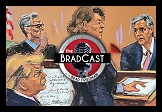 Trump Trial Ketchup: Cohen, 'Smoking Gun', 'Cult of Trump': 'BradCast' 5/15/24
Trump Trial Ketchup: Cohen, 'Smoking Gun', 'Cult of Trump': 'BradCast' 5/15/24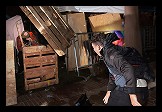 LAPD Right-Wing Bias in Violent Response to UCLA Protest Was No Surprise
LAPD Right-Wing Bias in Violent Response to UCLA Protest Was No Surprise Could Ohio Repubs REALLY Keep Biden Off the Ballot?!: 'BradCast' 5/14/24
Could Ohio Repubs REALLY Keep Biden Off the Ballot?!: 'BradCast' 5/14/24 'Green News Report' 5/14/24
'Green News Report' 5/14/24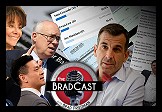 Recount in Tied House Primary Reveals Probs in CA Law: 'BradCast' 5/13/24
Recount in Tied House Primary Reveals Probs in CA Law: 'BradCast' 5/13/24 Sunday 'Stormy Weather Continues' Toons
Sunday 'Stormy Weather Continues' Toons 'Green News Report' 5/9/24
'Green News Report' 5/9/24 Facing Down the Threat to American Democracy: 'BradCast' 5/9/24
Facing Down the Threat to American Democracy: 'BradCast' 5/9/24 Trump Trial Ketchup:
Trump Trial Ketchup: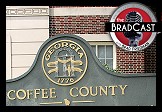 New Cybersecurity Breach in Coffee County, GA: 'BradCast' 5/7/24
New Cybersecurity Breach in Coffee County, GA: 'BradCast' 5/7/24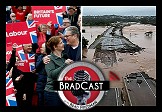 2024 Electoral -- and Climate -- Omens: 'BradCast' 5/6/24
2024 Electoral -- and Climate -- Omens: 'BradCast' 5/6/24 Pro-Palestine Protests, Proportionality, and Political Perspective: 'BradCast' 5/2/24
Pro-Palestine Protests, Proportionality, and Political Perspective: 'BradCast' 5/2/24 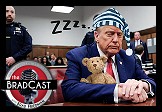 Trump Trial Ketchup: Criminal Contempt and His Two-Tier Justice: 'BradCast' 5/1/24
Trump Trial Ketchup: Criminal Contempt and His Two-Tier Justice: 'BradCast' 5/1/24 CANNING: Third-Party Myopia v. Democracy's Survival
CANNING: Third-Party Myopia v. Democracy's Survival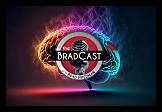 A Few Hits of Dopamine for Your Listening Pleasure: 'BradCast' 4/30/24
A Few Hits of Dopamine for Your Listening Pleasure: 'BradCast' 4/30/24
 VA GOP VOTER REG FRAUDSTER OFF HOOK
VA GOP VOTER REG FRAUDSTER OFF HOOK Criminal GOP Voter Registration Fraud Probe Expanding in VA
Criminal GOP Voter Registration Fraud Probe Expanding in VA DOJ PROBE SOUGHT AFTER VA ARREST
DOJ PROBE SOUGHT AFTER VA ARREST Arrest in VA: GOP Voter Reg Scandal Widens
Arrest in VA: GOP Voter Reg Scandal Widens ALL TOGETHER: ROVE, SPROUL, KOCHS, RNC
ALL TOGETHER: ROVE, SPROUL, KOCHS, RNC LATimes: RNC's 'Fired' Sproul Working for Repubs in 'as Many as 30 States'
LATimes: RNC's 'Fired' Sproul Working for Repubs in 'as Many as 30 States' 'Fired' Sproul Group 'Cloned', Still Working for Republicans in At Least 10 States
'Fired' Sproul Group 'Cloned', Still Working for Republicans in At Least 10 States FINALLY: FOX ON GOP REG FRAUD SCANDAL
FINALLY: FOX ON GOP REG FRAUD SCANDAL COLORADO FOLLOWS FLORIDA WITH GOP CRIMINAL INVESTIGATION
COLORADO FOLLOWS FLORIDA WITH GOP CRIMINAL INVESTIGATION CRIMINAL PROBE LAUNCHED INTO GOP VOTER REGISTRATION FRAUD SCANDAL IN FL
CRIMINAL PROBE LAUNCHED INTO GOP VOTER REGISTRATION FRAUD SCANDAL IN FL Brad Breaks PA Photo ID & GOP Registration Fraud Scandal News on Hartmann TV
Brad Breaks PA Photo ID & GOP Registration Fraud Scandal News on Hartmann TV  CAUGHT ON TAPE: COORDINATED NATIONWIDE GOP VOTER REG SCAM
CAUGHT ON TAPE: COORDINATED NATIONWIDE GOP VOTER REG SCAM CRIMINAL ELECTION FRAUD COMPLAINT FILED AGAINST GOP 'FRAUD' FIRM
CRIMINAL ELECTION FRAUD COMPLAINT FILED AGAINST GOP 'FRAUD' FIRM RICK SCOTT GETS ROLLED IN GOP REGISTRATION FRAUD SCANDAL
RICK SCOTT GETS ROLLED IN GOP REGISTRATION FRAUD SCANDAL VIDEO: Brad Breaks GOP Reg Fraud Scandal on Hartmann TV
VIDEO: Brad Breaks GOP Reg Fraud Scandal on Hartmann TV RNC FIRES NATIONAL VOTER REGISTRATION FIRM FOR FRAUD
RNC FIRES NATIONAL VOTER REGISTRATION FIRM FOR FRAUD EXCLUSIVE: Intvw w/ FL Official Who First Discovered GOP Reg Fraud
EXCLUSIVE: Intvw w/ FL Official Who First Discovered GOP Reg Fraud GOP REGISTRATION FRAUD FOUND IN FL
GOP REGISTRATION FRAUD FOUND IN FL


































